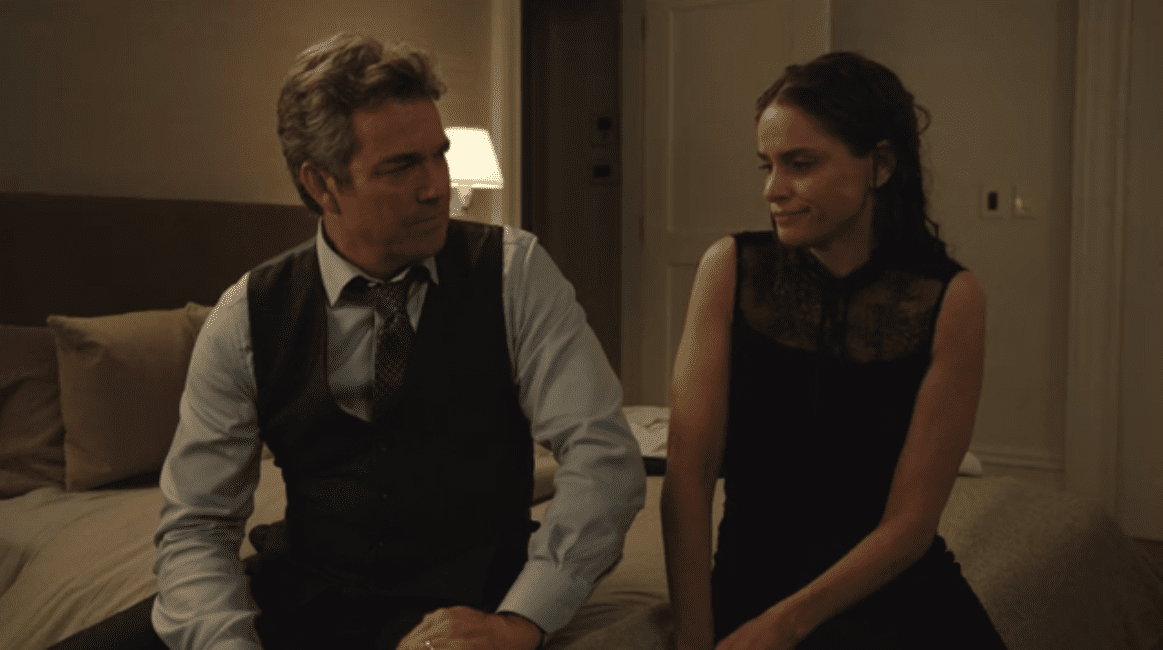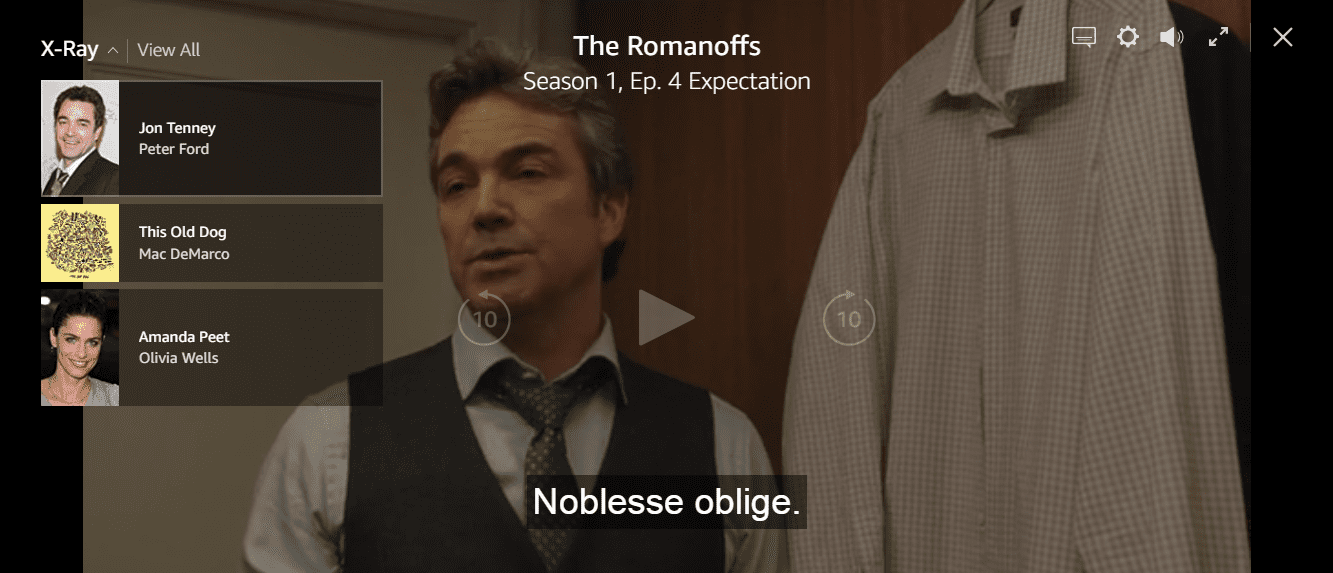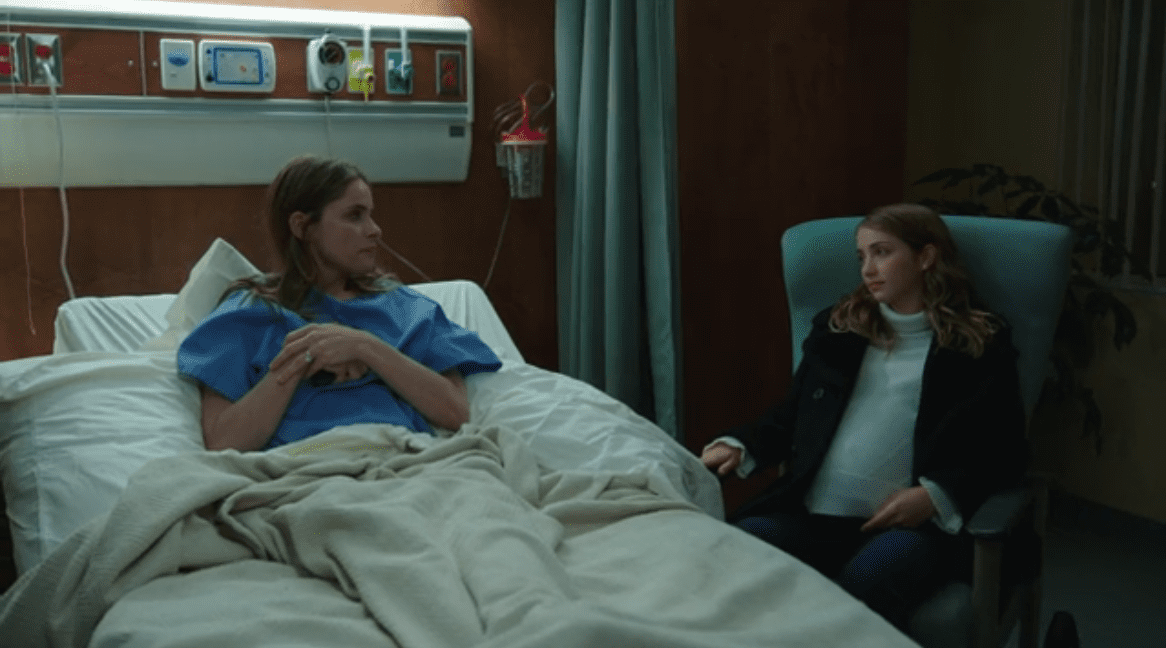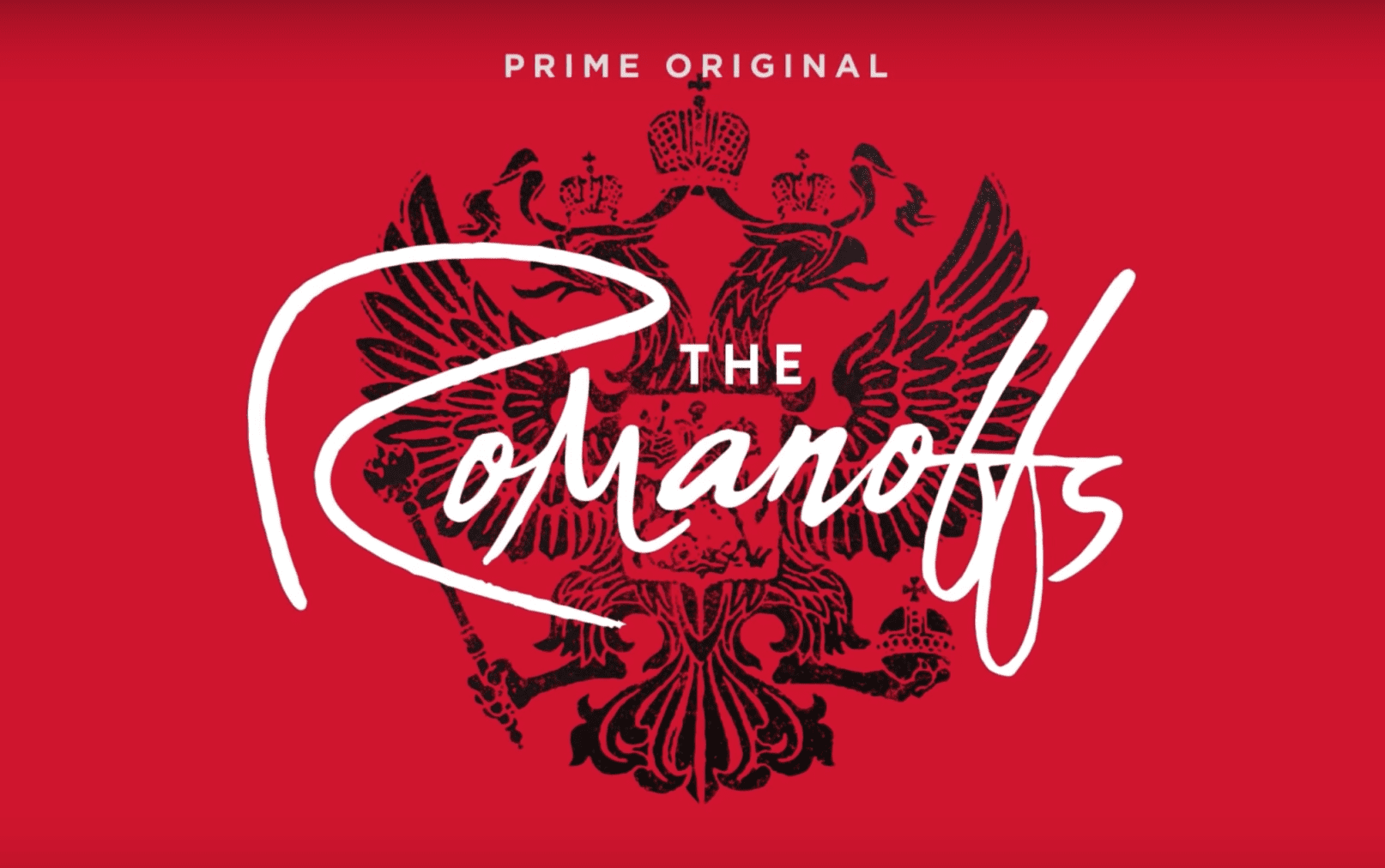Our coverage of the 8-part Amazon Prime series The Romanoffs from Mad Men creator Matthew Weiner continues with Caemeron Crain’s analysis of the fourth episode: “Expectation”
“Expectation” is an aptly titled hour of television. On the one hand, this is because the episode centers on an overdue pregnancy, but it also relates to the feeling of the hour as a whole. One watches with the expectation that something will happen—perhaps the birth of a supposed Romanoff child—but it doesn’t. By the end, the child has not been born, Julia’s secret has not been revealed, and, in short…nothing has happened.
I take it that this is what the episode was going for—a sense of expectation on the part of the audience to parallel that of the characters involved in the story—but I unfortunately cannot say that it pulled it off well. Instead of creating a meaningful tension, the lack of action in the story tended to lead to possible boredom. And the elliptical nature of the conversations between Julia Wells (Amanda Peet) and others does not create a sense of mystery so much as frustration.
Normally, I would be all for a show withholding expository dialogue. Insofar as the characters know what they are talking about, it is often highly unrealistic to have them relay information to one another that each already knows for the sake of the audience. “Expectation” seems to suffer from the opposite problem, however; not that the dialogue contains too little information to be able to follow, but that it is so elliptical that it begins to feel unrealistic.
During the exchange between Julia and Daniel Reese (John Slattery) in Strand, for example, the two seem almost at pains to avoid mentioning precisely what it is they are talking about. What’s worse is that it is not hard to figure out. We didn’t need Julia’s later explanation to “Gary Beethoven” (David Ferry) in order to know that Daniel was, in fact, the biological father of Julia’s daughter Ella (Emily Rudd). If the exposition offered in that scene served any function, it was to instead elucidate Julia’s mental anguish.
That she not only loved, but continues to love two different men, and that it pains her to the point of being nigh unbearable that due to her secret neither will “really” be the grandfather of her soon to be born grandchild, provides interesting terrain to explore. Unfortunately, the show does not really do so.
Perhaps the flashbacks were meant to deepen this aspect of the story, but something about them felt off such that they didn’t land. The actors cast to portray the younger versions of the characters didn’t look sufficiently like them, which is odd given that they really didn’t speak; such resemblance would have been the primary criterion for casting, one would think. Further, something about how the flashbacks themselves were presented felt a bit cheesy.
Perhaps all of this was intentional, however, and “Expectation” is trying to play a far more sophisticated game. The Romanoffs seems to be generally interested in playing with the line between fact and fiction, or reality and fantasy in the broadest possible sense. “House of Special Purpose” exemplified this, and we seem to learn in “Expectation” that the Romanovs TV show of that episode is being based on Daniel Reese’s book.
Equally, the most powerful scene of “Expectation” is a fantasy: when Julia admits her secret to her husband, Eric (Jon Tenney) only to have him say that he has always known and so on. In reality, he is watching Jeopardy! and hardly seems open to the revealing of such a hard truth. Nor does he seem to already know it, even if the final scene of the hour indicates that Ella does.

This truth also means that the baby about to be born will not, in fact, extend the Romanoff bloodline, since the biological father is Daniel Reese and not the (purported) Romanoff, Eric. Or is his name Peter Ford, as the credits would have it? I was first confused about this while watching the episode, as I hovered over the video on Amazon Prime, bringing up the overlaid scene credits during one of the flashback scenes, to see “Young Peter”—who is Peter?
Well, it would seem that Jon Tenney’s character, who is consistently called Eric, is listed as Peter Ford on both IMDB and in the Amazon overlay information. Similarly, Amanda Peet is credited on IMDB as “Olivia Wells” (note that Olivia was also the name of Christina Hendricks’ character last week) even though the character is consistently called Julia, while Anni Krueger, who plays the younger version of the same, is credited as “Young Julia.” And, to make matters worse, the Amazon overlay credits name Amanda Peet as “Olivia Wells” late in the episode despite the fact that they have her as “Julia Wells” at the beginning. I have not found an instance of Amazon tagging Tenney as “Eric”—although, again, that is what he is always called—but I wouldn’t be surprised if there is one.

Of course, it would be easy to rack all of this up to a mistake. Perhaps the names of the characters were changed late in the game, or something like that, but I instead want to suggest that it might be a clue to reading the episode as a whole.
At the center of “Expectation” is an unborn child whom everyone thinks will be a Romanoff when in fact he won’t be. This parallels the claims of those who pretend to be directly descended from Nicholas II, which are at best ambiguous, and at worst false, insofar as the official history is that the entire family was killed in 1918. This has not, however, stopped any number of pretenders—most famously Anna Anderson—from arising over the years and attracting believers. Thus, while the show has not been forthright as to whether the “Romanoffs” who feature as characters are claiming such a direct lineage, the ambiguity with regard to claims to Romanov blood has been at its center from the beginning.
“House of Special Purpose” extended that ambiguity as to what is real and what isn’t to the experience of the viewer, and perhaps the indication that the TV series in that episode is based on Daniel Reese’s book is meant as an indication that we ought to read “Expectation” along similar lines.
This would mean that the characters are given differing names not through some mistake, but to indicate that reality in question itself is fuzzy. Our experience is informed by our memories and our fantasies such that no stark line can be drawn between them and the facts of the matter. We might view ourselves as characters in a drama when in fact we are just plugging along in the mundane affairs of living, and even though one possesses a heavy secret…nothing happens.
Which is more real: Julia’s inner life, wracked by anguish over her lie/secret, or the façade she puts on with her husband (when, it so happens, Amazon marks her as “Olivia”)? Which is the “real” person? And if those flashbacks are cheesy, perhaps this is meant to point out the way in which we idealize our own memories, rather than recollecting events as they occurred. And at a meta-level, I want to suggest that “Expectation” intends to remind us that we are watching a TV show—which is a fantasy in its own right—while denying us the gratification we’ve come to expect from the same.
When Julia leaves her apartment early in the episode, we can see that her address is 47. This could be a random happenstance, but in the background is the fact that there are those who claim that 47 is the quintessential random number. There is even a 47 society that began in Pomona, CA. It is not entirely clear whether the initial claim about the number was meant as a joke, but it is pretty clear that it has been taken up as a kind of inside joke in the TV/film industry. If the inaugural claim was that 47 would show up randomly more than any other number, or something like that, the industry has given a winking push to make that seem all the more true, as any number of writers have defaulted to 47 when they needed a number and it didn’t really matter what it was.
As such, I am tempted to take this as further evidence that “Expectation” is trying to do something very clever in terms of playing with the fact that we know that we are watching a TV show, and subverting our expectations about what we are going to get. Daniel Reese talks about buying a screenwriting book, because “apparently you’re supposed to save a cat or something” while this episode does almost nothing to save the proverbial cat; offering only a scene near the beginning where Julia helps a young mother get through a revolving door—she may as well literally save a cat from a tree. Is this all meant as a critique of formulaic screenwriting/TV?

If so, we might read it as incredibly clever, playing with what we expect as viewers, only to withhold the payoff from us, even in the final scene as it becomes clear that Ella understands her mother’s relationship with Daniel, though nothing is directly said about it. And we might further think about how concerns about image, or status, can play a role in certain truths being ignored: if Julia made it known that Daniel was Ella’s biological father, it wouldn’t just have interpersonal consequences, but undermine those that relate to the idea that this child will carry on the Romanoff line. Such things might lead us to think that the right thing to do is pretend even when we know something is not true.
Unfortunately, I can’t pretend that “Expectation” was a good hour of television. Even if it was trying to do what I think it was; even if it was terribly clever, it was perhaps too clever. It’s one thing to subvert the tropes and clichés that define so much of modern screenwriting. It’s another to be boring. And, I’m afraid, much of this episode struck me as the latter. I didn’t really care—perhaps because they didn’t sufficiently “save the cat”—but instead felt awash in a sea of events I felt little connection to, getting irked by things like Julia not finishing her beer before a waiter takes it away and gives her a new one, instead of getting caught in the flow of the story.
I still have faith in The Romanoffs, though. I think this week gave us an idea that faltered in its actualization, but which at least showed promise as an idea. Doing episodes that differ this much from one week to the next is a ballsy proposition, so it’s no surprise if things don’t always work out. I’m still looking forward to next week.

Want to talk more about the The Romanoffs? Join this (burgeoning, I hope) sub on Reddit that I am active in, and/or hit me up on Twitter @caemeronCC. Lindsay should be back next week, and we plan to do some more discussion/roundtable posts in the future. Stay tuned, and thanks for reading!

